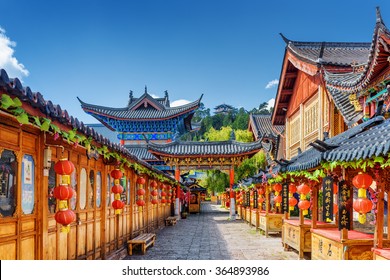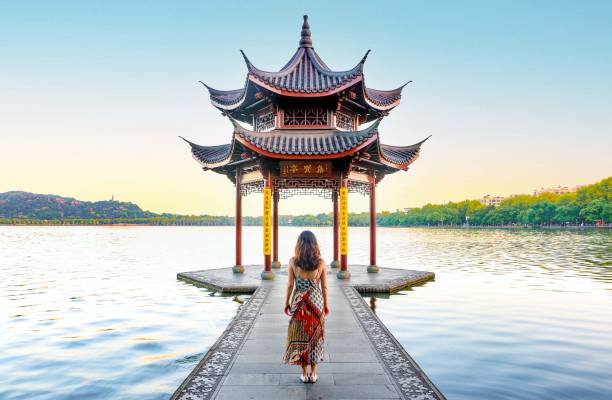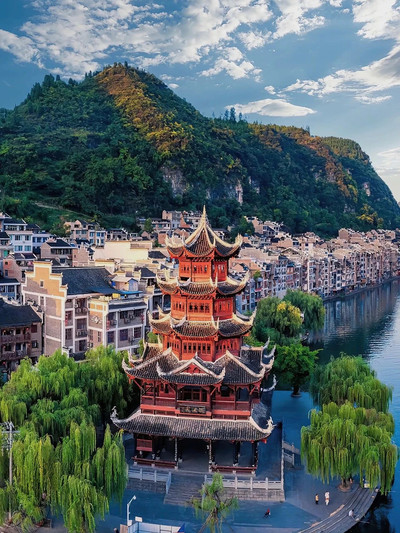The Beauty of Hua Zu Temple: Tips for Your Visit

An Essential Guide to Visiting Hua Zu Temple
Nestled in the heart of Henan Province, Hua Zu Temple (华祖庵) stands as a tribute to one of China’s most revered historical figures—Hua Tuo, the legendary physician of the Eastern Han Dynasty. This sacred site is more than just a temple; it is a portal into the past, where the echoes of ancient wisdom and healing resonate through the air. As you step through its ornate gates, you are greeted by a serene atmosphere that invites reflection and reverence.
The temple, adorned with intricate carvings and vibrant murals, captures the essence of traditional Chinese architecture, offering visitors a glimpse into the artistic and cultural heritage of the Ming and Qing Dynasties. Here, you can wander through peaceful courtyards, marvel at the detailed sculptures, and discover the historical significance of Hua Tuo, whose innovative medical practices paved the way for future generations.
Whether you are a history enthusiast, a spiritual seeker, or simply a traveler looking for a tranquil escape, Hua Zu Temple promises an enriching experience. Join us as we explore the highlights of this remarkable temple, its fascinating lore, and the best tips for making the most of your visit to this ancient sanctuary dedicated to the divine healer.
In This Guide
- An Essential Guide to Visiting Hua Zu Temple
- The Rich History and Legends of Hua Zu Temple
- Main Highlights: What You Absolutely Can’t Miss
- Planning Your Visit: A Practical Guide
- Tickets: Prices, Booking, and Tips
- How to Get There: A Complete Transportation Guide
- Local Cuisine and Accommodation Nearby
- Frequently Asked Questions
- Final Thoughts on Your Trip
The Rich History and Legends of Hua Zu Temple
Hua Zu Temple, known as 华祖庵 in Chinese, is more than just a spiritual sanctuary; it is a living testament to the rich tapestry of Chinese history and culture. Nestled in the heart of Henan Province, this temple is dedicated to Hua Tuo, a revered medical figure from the late Eastern Han Dynasty, celebrated for his extraordinary healing abilities and innovative medical practices.
The origins of Hua Zu Temple can be traced back to the legacy of Hua Tuo himself, who is often hailed as the “Father of Chinese Medicine.” His pioneering techniques, such as acupuncture and herbal remedies, have left an indelible mark on the medical field. As a result, temples and shrines dedicated to him began to emerge across China, with Hua Zu Temple being one of the most significant. The temple was primarily established during the Ming and Qing Dynasties, reflecting the enduring reverence for Hua Tuo’s contributions to medicine and health.
Local records indicate that there are twelve temples and shrines honoring Hua Tuo scattered across nine counties in Henan, with Hua Zu Temple situated near his birthplace. This proximity adds a layer of authenticity to the temple’s significance, making it a pilgrimage site for those seeking to honor the ancient healer. Visitors can explore the temple’s intricate architecture, which exemplifies traditional Chinese design, featuring graceful eaves, wooden beams, and vibrant sculptures that narrate the stories of Hua Tuo’s life and his legendary prowess.
The temple’s serene surroundings also contribute to its allure. Visitors are often greeted by tranquil gardens and ancient trees, creating a peaceful atmosphere that invites reflection and meditation. Various relics and artifacts housed within the temple provide further insight into Hua Tuo’s life, including ancient texts that detail his medical philosophies and practices.
Beyond its historical and cultural significance, Hua Zu Temple is steeped in legends that add to its mystique. One popular tale recounts how Hua Tuo performed miraculous surgeries using only a few herbs and his unparalleled skills, leaving patients in awe of his capabilities. Another legend speaks of his ability to communicate with the spirits of nature, a testament to the deep connection between traditional Chinese medicine and the natural world.
For international travelers, a visit to Hua Zu Temple offers a unique opportunity to immerse oneself in the rich history of Chinese medicine while experiencing the serene beauty of Henan Province. Whether you are a history enthusiast, a seeker of spiritual enlightenment, or simply curious about the legendary healer, Hua Zu Temple promises an enlightening journey through time. As you walk the hallowed grounds, you can almost feel the echoes of Hua Tuo’s wisdom whispering through the leaves, reminding us of the enduring power of healing and knowledge.

Hua Zu Temple.
Main Highlights: What You Absolutely Can’t Miss
When visiting Hua Zu Temple (华祖庵), a site steeped in history and reverence, there are several highlights that you simply cannot afford to miss. This temple, dedicated to the legendary physician Hua Tuo, offers not only a glimpse into ancient Chinese culture but also a serene environment perfect for reflection and exploration.
1. The Architectural Grandeur
As you approach Hua Zu Temple, be prepared to be awed by its stunning architecture. Constructed during the Ming and Qing Dynasties, the temple features traditional Chinese design elements, including intricate wooden carvings, sweeping roofs, and vibrant colors. Take time to admire the details, from stone lions guarding the entrance to beautifully painted beams that tell stories of the past.
2. Statue of Hua Tuo
At the heart of the temple stands a magnificent statue of Hua Tuo himself. This larger-than-life figure is surrounded by offerings from visitors who pay homage to his legendary healing skills. As you stand before this statue, reflect on Hua Tuo’s contributions to medicine and his lasting legacy in Chinese culture.
3. The Tranquil Gardens
Adjacent to the temple, you will find beautifully landscaped gardens that provide a peaceful respite from the hustle and bustle of daily life. Stroll along winding paths lined with ancient trees, fragrant flowers, and serene ponds. This tranquil setting is perfect for meditation or simply enjoying a moment of quiet reflection amidst nature.
4. Cultural Exhibits and Relics
Inside the temple, explore various exhibits that showcase artifacts related to Hua Tuo and traditional Chinese medicine. From ancient medical texts to tools used by practitioners in Hua Tuo’s time, these relics provide insight into the evolution of healthcare in China. Don’t miss the opportunity to learn about the fascinating history of Chinese medicine and its techniques.
5. Festivals and Ceremonies
If your visit coincides with one of the temple’s festivals, you are in for a treat. The Hua Zu Temple hosts various religious ceremonies and cultural festivals throughout the year, celebrating Hua Tuo’s contributions to medicine. These events often feature traditional music, dance, and local food, offering a vibrant glimpse into the communal spirit and traditions of the region.
6. Local Cuisine
No visit to Hua Zu Temple is complete without sampling the local dishes available nearby. Look for small eateries that serve traditional Henan cuisine, featuring hearty noodles and dumplings that will delight your palate. Enjoying a meal in this historic setting adds another layer to your cultural experience.
7. Souvenir Shops
Before you leave, make sure to stop by the souvenir shops located near the temple. Here, you can find unique handicrafts, religious artifacts, and books on Chinese medicine and history. Purchasing a token from your visit not only supports local artisans but also allows you to take a piece of Hua Zu Temple home with you.
8. Engaging with Local Monks
If you’re fortunate, you may have the opportunity to interact with the monks who maintain the temple. Their wisdom and insights about Hua Tuo’s teachings and the philosophy of traditional Chinese medicine can enrich your understanding of this remarkable site. Don’t hesitate to ask questions and learn more about the spiritual practices that continue to thrive here.
Conclusion
Hua Zu Temple is more than just a historical site; it is a living testament to the enduring legacy of Hua Tuo and the rich tapestry of Chinese culture. With its stunning architecture, peaceful gardens, and deep-rooted traditions, your visit promises to be enlightening and inspiring. Be sure to take your time and immerse yourself in all that this remarkable temple has to offer.

Hua Zu Temple.
Planning Your Visit: A Practical Guide
When planning your visit to Hua Zu Temple (华祖庵), it’s essential to prepare to fully appreciate this historical and cultural gem dedicated to the legendary physician Hua Tuo. Nestled in the heart of Henan Province, this temple not only honors a revered figure in Chinese medicine but also serves as a serene retreat where visitors can connect with history and spirituality. Below is a practical guide to help you make the most of your visit.
Getting There
Location: Hua Zu Temple is located in Henan Province, with the most accessible cities being Shangqiu, Zhoukou, and Xinyang. The temple is easily reachable by car or public transportation.
Transport Options:
– By Air: The nearest airport is in Zhengzhou, the capital city of Henan. From there, you can take a train or bus to your destination.
– By Train: High-speed trains connect Zhengzhou with several major cities. You can also find local trains that will take you closer to your destination.
– By Bus: Local buses frequently run to nearby towns, making it easy to reach the temple once you arrive in Henan.
Best Time to Visit
The ideal time to visit Hua Zu Temple is during the spring (April to June) and fall (September to November) when the weather is mild and pleasant. These seasons also offer a chance to enjoy the beautiful natural surroundings, as the temple is often framed by vibrant foliage.
Admission Information
While specific admission fees can vary, most temples in China have minimal charges or are free to enter. It’s best to check local listings or contact the temple directly for the most current information.
Dress Code and Etiquette
Hua Zu Temple is a place of reverence, so visitors should dress modestly. This means avoiding revealing clothing and ensuring that your attire is respectful of the site’s spiritual significance.
When visiting, please observe the following etiquette:
– Silence: Maintain a respectful volume to honor the sacred atmosphere.
– Photography: Always check if photography is allowed, particularly in worship areas.
– Respect Rituals: If ceremonies are taking place, remain respectful and avoid interruption.
What to Expect
Upon arrival, you will be greeted by the impressive architecture that reflects traditional Chinese design. Take your time to explore the various halls and pavilions dedicated to Hua Tuo, where you can view inscriptions and sculptures that tell the story of his life and contributions to medicine.
Key Highlights:
– Statues and Relics: Marvel at the intricately carved statues of Hua Tuo and his disciples.
– Historical Significance: Learn about the history of the temple, established during the Ming and Qing dynasties, and its role in Chinese medical heritage.
– Natural Surroundings: Wander through the peaceful grounds, which offer a perfect setting for contemplation and reflection.
Nearby Attractions
If you have time, consider exploring other nearby sites dedicated to Hua Tuo and Chinese medicine. The region is rich in historical significance, with various temples and natural attractions that provide insight into the cultural landscape of Henan Province.
Local Cuisine
Don’t miss the opportunity to sample local Henan cuisine. Look for small eateries or street vendors near the temple serving traditional dishes. Try the famous “Huanghuai” noodles or “Guo Bao Rou” (sweet and sour pork) for an authentic experience.
Practical Tips
- Language: While some signs may be in English, knowing a few basic Mandarin phrases can enhance your visit.
- Cash: While mobile payments are prevalent in China, it’s a good idea to have some cash on hand for small purchases.
- Health Precautions: If you’re traveling from abroad, ensure you have any necessary vaccinations and travel insurance.
By following this guide, you’ll be well-prepared to enjoy your visit to Hua Zu Temple, immersing yourself in the rich history and tranquil atmosphere that this sacred site offers. Safe travels!

Hua Zu Temple.
Tickets: Prices, Booking, and Tips
Visiting Hua Zu Temple (华祖庵) is an enriching experience that allows you to dive deep into the history of one of China’s most revered medical figures, Hua Tuo. To ensure your visit goes smoothly, here’s everything you need to know about ticket prices, booking options, and handy tips.
Ticket Prices
Admission to Hua Zu Temple is quite affordable, making it accessible for all travelers. As of the latest information, the entry fee is typically around 30 yuan (approximately $4.50 USD). This nominal fee grants you access to the temple grounds and allows you to soak in the serene atmosphere while exploring the historical architecture.
Booking Options
While tickets can be purchased directly at the entrance, it’s a good idea to check if advance booking is available, especially during peak tourist seasons. Some travelers prefer to secure their tickets online through local travel websites or apps, which may offer special discounts or package deals that include guided tours.
Payment Methods
At the temple, you can conveniently pay for your tickets using various methods. Cash is always accepted, but digital payment options like Alipay and WeChat Pay are widely used in China, making the process quick and easy. Ensure you have these apps set up on your phone if you prefer cashless transactions.
Tips for Your Visit
-
Best Time to Visit: Aim to visit during weekdays or early mornings to avoid crowds, allowing for a more peaceful exploration of the temple grounds.
-
Dress Appropriately: As a place of worship and reflection, it’s respectful to dress modestly. Comfortable shoes are also recommended, as you may be walking around the grounds for a while.
-
Explore the Surroundings: Take some time to explore the surrounding areas of the temple. The local scenery and nearby attractions offer additional insights into the culture and history of the region.
-
Guided Tours: Consider joining a guided tour if you wish to learn more about Hua Tuo’s legacy and the significance of the temple. Local guides can provide valuable context and stories that enhance your visit.
-
Photography: Don’t forget your camera! The temple’s architecture and serene gardens provide numerous photo opportunities. However, be mindful of signs indicating where photography is restricted.
By keeping these details in mind, you’ll be well-prepared for your visit to Hua Zu Temple, ensuring a memorable and enlightening experience that honors the legacy of one of China’s most famous medical practitioners. Enjoy your journey through history!
How to Get There: A Complete Transportation Guide
Getting to Hua Zu Temple (华祖庵) can be an enriching part of your journey, offering a glimpse into both the historical significance and natural beauty of Henan Province. Here’s a comprehensive guide to help you navigate your way to this revered site.
By Air
The nearest major airport to Hua Zu Temple is Zhengzhou Xinzheng International Airport (CGO), located approximately 130 kilometers away. This airport is well connected with major cities in China and offers international flights as well.
Steps:
1. Arrive at Zhengzhou Xinzheng International Airport.
2. Transportation from the Airport:
– Taxi: The most convenient option is to take a taxi directly to Hua Zu Temple, but be prepared for a journey of about 2 hours.
– Bus: Alternatively, you can take a bus from the airport to Zhengzhou city center, and then switch to a long-distance bus to Shangqiu (the nearest city to Hua Zu Temple).
By Train
Zhengzhou Railway Station is a major hub that connects to numerous cities across China. From here, you can catch a train to Shangqiu, which is the closest city to Hua Zu Temple.
Steps:
1. Travel to Zhengzhou Railway Station.
2. Board a train to Shangqiu:
– Trains run regularly and the journey takes about 1.5 to 2 hours depending on the service.
3. From Shangqiu to Hua Zu Temple:
– Taxi: Upon arrival in Shangqiu, you can take a taxi to Hua Zu Temple, which is about a 30-minute drive away.
– Public Transport: Alternatively, look for local buses heading towards the temple area, though this may require some additional navigation.
By Bus
For those who prefer road travel, long-distance buses are available from various cities directly to Shangqiu.
Steps:
1. Find a Bus Station: Look for a long-distance bus station in your current location (e.g., Zhengzhou, Xinyang, or other nearby cities).
2. Purchase a Ticket to Shangqiu: Buses operate frequently, and the travel time varies depending on traffic but generally ranges from 2 to 3 hours.
3. Reach Hua Zu Temple:
– Similar to the train option, take a taxi or local bus from Shangqiu to Hua Zu Temple.
Local Transportation
Once you arrive at Hua Zu Temple, getting around can be done via taxis or local buses. If you’re looking to explore the surrounding area, consider renting a bicycle or simply taking a leisurely walk through the beautiful landscapes nearby.
Tips for Travelers
- Language: While some signs may be in English, having a translation app or a phrasebook can be handy since English is not widely spoken in rural areas.
- Cash: Keep some Chinese Yuan (CNY) on hand, as not all places accept credit cards, especially in more rural locations.
- Travel Times: Consider traffic conditions, especially during peak hours or local festivals, which can affect your travel times.
- Check Schedules: Train and bus schedules can vary, so it’s wise to check ahead of time to ensure a smooth journey.
With this guide, you’ll be well-equipped to reach Hua Zu Temple and immerse yourself in its rich historical and cultural significance. Enjoy your journey!

Hua Zu Temple.
Local Cuisine and Accommodation Nearby
When visiting the revered Hua Zu Temple, travelers will find themselves immersed not only in its historical and cultural essence but also in the flavors and comforts of the local area. Whether you’re indulging in traditional dishes or seeking a cozy place to rest after a day of exploration, the surroundings offer delightful options.
Culinary Delights
-
Local Street Food Stalls
Just a short stroll from the temple, the bustling street food scene awaits. Sample local favorites like Guo Bao Rou (sweet and sour pork) and Jian Bing (savory pancakes filled with egg and various fillings). These quick bites are perfect for travelers on the go and provide an authentic taste of Henan’s culinary culture. -
Hua Tuo Restaurant
Located nearby, this restaurant prides itself on dishes inspired by the legendary physician Hua Tuo. Signature offerings include Herbal Chicken Soup and Steamed Fish with Ginger and Scallions, both crafted to reflect the region’s rich medical traditions and flavors. The warm ambiance makes it a great spot for families and groups. -
Xinyang Tea House
Don’t miss out on the chance to experience a traditional tea ceremony at this charming tea house. Sample local varieties like Xinyang Maojian, a renowned green tea, while enjoying light snacks such as Tea Eggs and Dried Fruit Platters. The serene setting is perfect for unwinding after a temple visit.
Comfortable Stays
-
Hua Zu Inn
Just a stone’s throw from the temple, this quaint inn offers comfortable accommodations with a touch of local charm. Guests can enjoy beautifully decorated rooms and a complimentary breakfast featuring local delicacies. The friendly staff is more than happy to provide recommendations for exploring the area. -
Shangqiu Hotel
For those seeking more modern amenities, the Shangqiu Hotel provides a range of comfortable rooms with excellent facilities. The hotel features an on-site restaurant serving both local and international cuisine, a fitness center, and convenient access to transportation hubs. -
Xinyang Boutique Hotel
About a 15-minute drive from Hua Zu Temple, this stylish boutique hotel offers a blend of contemporary comforts and traditional aesthetics. Guests can enjoy spacious rooms, a relaxing lounge area, and an on-site café that serves delicious pastries and coffee to start your day right.
With these delightful dining and accommodation options, your visit to Hua Zu Temple will be as enriching for your palate as it is for your spirit. Enjoy the blend of history, culture, and local flavors that make this destination truly special.

Hua Zu Temple.
Frequently Asked Questions
-
What is Hua Zu Temple and why is it significant?
Hua Zu Temple (华祖庵) is dedicated to Hua Tuo, a legendary physician from the late Eastern Han Dynasty, known for his remarkable medical skills. The temple serves as a tribute to his legacy and is an important cultural and historical site in Henan Province, China. -
Where is Hua Zu Temple located?
The temple is situated in Henan Province, close to Hua Tuo’s hometown. It is primarily found in counties such as Shangqiu, Zhoukou, and Xinyang along the Huai River, making it accessible for visitors exploring this region. -
What are the visiting hours for Hua Zu Temple?
Hua Zu Temple typically opens from 8:00 AM to 5:00 PM. However, it is advisable to check local sources before your visit, as hours may vary seasonally or due to special events. -
Is there an admission fee to enter the temple?
Yes, there is usually a small admission fee to enter Hua Zu Temple. The price can vary based on the season and any special exhibitions or events taking place at the temple. It’s best to bring cash or a digital payment method, as some places may not accept credit cards. -
What should I wear when visiting Hua Zu Temple?
Visitors are recommended to wear comfortable clothing and footwear suitable for walking. Since it is a place of worship, modest attire is appreciated. Additionally, consider bringing a light jacket if you plan to visit during cooler months. -
Are there guided tours available at Hua Zu Temple?
Yes, guided tours are often available and can enhance your experience by providing deeper insights into the temple’s history and significance. Check in advance if you require a guide, as some tours may need to be booked ahead of time. -
What can I expect to see at Hua Zu Temple?
At Hua Zu Temple, you can explore several halls dedicated to Hua Tuo, beautiful traditional architecture, and serene gardens. The atmosphere is peaceful, providing a perfect backdrop for reflection and appreciation of Chinese history and culture. -
Are there nearby attractions to visit after Hua Zu Temple?
Absolutely! After visiting Hua Zu Temple, consider exploring other historical sites in Henan Province, such as the ancient city of Kaifeng or the beautiful landscapes of the Yellow River. There are also local markets and eateries where you can enjoy traditional Henanese cuisine.
Final Thoughts on Your Trip
As your journey draws to a close at Hua Zu Temple (华祖庵), take a moment to reflect on the rich tapestry of history and culture that envelops this sacred site. Nestled in the heart of Henan province, this temple stands as a tribute to Hua Tuo, the legendary physician whose remarkable skills have transcended time and continue to inspire reverence.
Wandering through the serene pathways and admiring the intricate architecture, you’ll find yourself immersed in the deep spiritual essence that resonates within the temple’s walls. The blend of natural beauty and historical significance makes Hua Zu Temple not just a place of worship, but a sanctuary of healing and reflection.
Whether you’re seeking solace, enlightenment, or simply a deeper understanding of Chinese heritage, this temple offers a unique glimpse into the past that enriches the present. As you leave, carry with you the wisdom of Hua Tuo and the tranquil energy of the temple, allowing it to echo in your heart long after your visit.
Embrace the spirit of discovery that brought you to this enchanting site, and let your experiences at Hua Zu Temple inspire your future travels. The world is vast, filled with stories waiting to be told—each destination a new chapter in your journey. Safe travels!